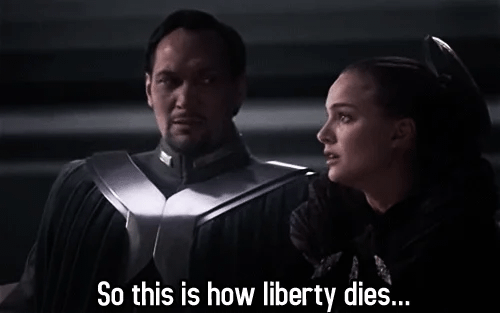Algorithms are inhuman.
So why are we allowing them to control the most human pursuit - our democratic institutions?
I recently watched a podcast clip on Instagram between two Gen Z-ers, one advocating for Donald Trump and the other for Kamala Harris. The 1-minute, 28-second clip was pretty enraging—hence why it went viral. The argument was tense, and although in concept I sided with the one advocating for Harris, the exaggerated and performative nature of it was off-putting. For the next hour, I was annoyed. A 1-minute video caused over 60 minutes of turmoil. I replayed the debate in my head, thinking about how frustrating the conversation I witnessed was, since it represented such extremes. After the turmoil came exhaustion. I was sad I had “wasted” an hour of my life over a video that taught me nothing new or interesting about either campaign or the issues at hand. It was an echo pretending to have substance, but it was really empty—another useless, out-of-touch conversation on a screen. Here were people my age, with similar educational backgrounds, living in similar cities, and yet I could not feel more disconnected from them.
Despite what's on the screens, we have more in common than what divides us.
I often solo road-trip across the US with my dog, and I love visiting rural areas with people whose background couldn’t be more different than mine. These places remind me that despite the extremes fed to us on social media, in the news, or through ads, the reality is we are all much more reasonable and grounded, with far more in common than what divides us. In northern Michigan, I met a White male veteran who was disgruntled by the state of the country. Our life experiences could not be more different, and yet we found common ground, from agreeing that 'billionaires shouldn't exist' to recognizing that the quality of life has significantly declined and no longer serves most people. We may vote for different candidates and are on different sides of the current political spectrum, but at the end of the day, a White male veteran from rural Michigan and an Indian immigrant from Connecticut found shared understanding in wanting a safe, sustainable life for ourselves and those around us.
The algorithms are inhuman.
Eighty percent of Americans get their news from social media. Yet, social media algorithms are not designed to show us facts and nuance; they’re not designed to spark healthy conversations or debates; they’re not designed to connect us (no matter what Mark Zuckerberg says). They’re designed to take humanity out of context, to place our characteristics, behaviors, and values in neat numbers that can be manipulated to capture our attention, our data, and our money. Complexity goes against algorithmic design—if it can’t put our belief systems in a box, it can’t sell to us. But we are complex. There is nuance in my experiences and therefore nuance in my ideologies that don’t fit into the rhetoric that is shown on social media and in the new. Our democratic institutions are complex and they should be to represent the nuance and diversity of its people. A 2023 USC study shows that frequent users of social media platforms share roughly the same amount of fake news as they do real news, even sharing fake news that goes against their political beliefs. We are literally sharing against our own beliefs for more likes, views, and the addictive high that the false idea of “likeability” gives us.
We are human.
Today is election day. We will see the extremes amplified across every screen today and probably for the next couple of months. Divisiveness and conflict will reign on the Internet and on our TVs, because that captures our attention, our data, and our money. But I invite you to ask a simple question: Where is the humanity?
We live in an online world filled with fakeness, and it is only going to be filled with more fake content as generative AI becomes more prominent. But our neighbor isn’t fake. Our friend isn’t fake. The stranger we pass by isn’t fake. We can ground ourselves in our humanity.


